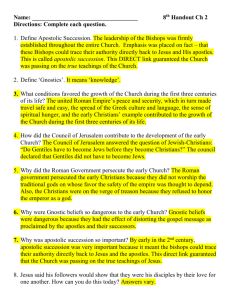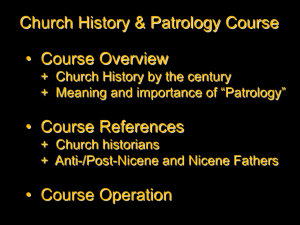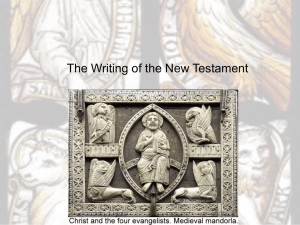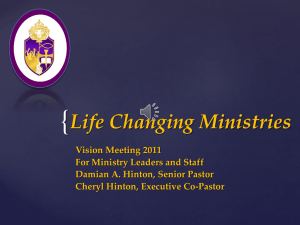Apostolic Ministry, Contemporary Missions, and Missio Dei
advertisement
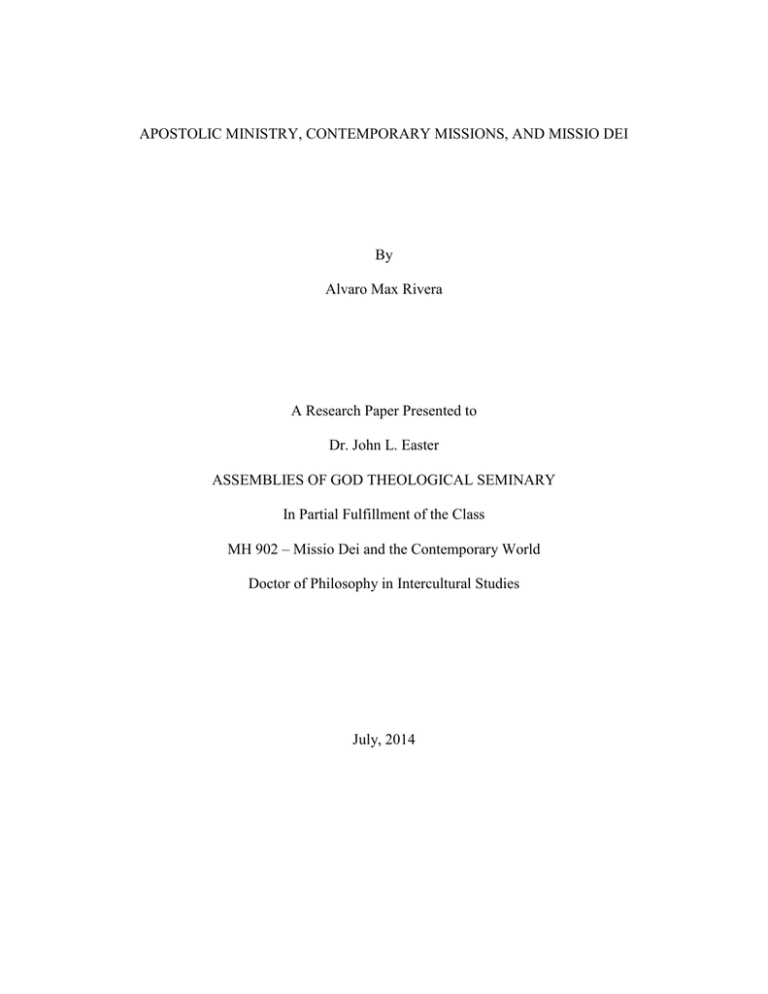
APOSTOLIC MINISTRY, CONTEMPORARY MISSIONS, AND MISSIO DEI By Alvaro Max Rivera A Research Paper Presented to Dr. John L. Easter ASSEMBLIES OF GOD THEOLOGICAL SEMINARY In Partial Fulfillment of the Class MH 902 – Missio Dei and the Contemporary World Doctor of Philosophy in Intercultural Studies July, 2014 CONTENTS INTRODUCTION 1 CHAPTER 1 A REVIEW REGARDING THE VALIDITY OF APOSTOLIC MINISTRY Order of authority or functionality The Apostles and Prophets of Ephesians 2:20 and 4:11 as Foundational Ephesians 2:20 Ephesians 4:11 Apostles of Christ Apostolic Function The Commanding of Going in Matthew 28:19-20 The case of Paul The Holy Spirit and the Empowering in the Old and New Testaments. 2 3 4 4 5 6 8 10 11 13 CHAPTER 2 CONTROVERSIAL PERSPECTIVES REGARDING APOSTLESHIP Apostolic Succession Apostolic Reformation 13 13 15 CHAPTER 3 CONTEMPORARY MISSIONS AND APOSTOLIC MINISTRY, A CASE STUDY Historical Background to the Ministry of John Bueno John Bueno’s Ministry and the Consideration of Apostleship Bueno´s Philosophy of Ministry Sharing the Gospel as Essential Element in the Life of the Church 18 18 18 19 20 CONCLUSION 23 REFERENCE LIST 24 INTRODUCTION The conceptualization of apostolic ministry has great importance for review today. For the past two decades this concept has gone through different understandings and controversies in regards to the definition of an apostle. If such ministry still operates, what do the role expectations include and how does the authority of this ascribed office be exercised? The intention of this paper will examine the validity of the apostolic ministry in our day, its relationship to missionary work, and how it relates to missionaries who have shown characteristics of an apostolic ministry. In this paper, the ministry of John Bueno who showed these characteristics and his work in El Salvador will be studied. For the purpose of a better framework of reference, the paper will also explore different positions that may express radical postures such as apostolic succession and the apostolic reformation of the Church. Then, ponder if such positions are ineludible ways to accomplish the work of the Church, or if the understanding of an apostolic function will suffice for the health of the Church. 1 CHAPTER 1 A REVIEW REGARDING THE VALIDITY OF APOSTOLIC MINISTRY Alan Johnson quoting Colin Brown mentions the way the term apostleship, a term rarely used in the secular Greek culture of New Testament times, came forth to be used within the Church. The meaning of the term expresses something similar to what the Hebrew word saliah expressed in regards to send or sending away (Johnson 2006, 4). The verb shalah denotes the verb used in the Old Testament to express the action of sending. This sending refers to God or to a human as the sending agent (Renn 2005, 42). The Old Testament provides clear examples related to sending as seen in the stories of Joseph, Moses, Joshua, Samuel, Jeremiah, and numerous others. In the New Testament the verb that expresses the action of sending equals to apostello. Thus, the designation of apostles expresses the idea of those being sent. In the case of Moses for instance, he realized God sent him to deliver the people of Israel (Exodus 3:12-16; 7:16; Deuteronomy 34:11). However, Moses also sends or commissions men to go and spy the land of Canaan (Numbers 13:1-33) (Renn, 43). In the narrative of Numbers 13, Moses sends twelve spies and in a sense it resembles the designation of the twelve apostles in the New Testament. Of course, the twelve spies do not form the basis for the formation of the nation of Israel as do the twelve apostles who provided the important foundation of the Church (Ephesians 2:11). Nevertheless, these spies had the mission of foreseeing the land to facilitate the advancement of the people of Israel. Another important aspect related to the sending or commissioning involves the sending of the prophets in the Old Testament. Two examples include the prophets Isaiah and Jeremiah. In the case of Isaiah, in chapter 6:8-9 it says, “Then I heard the voice of the Lord saying, ‘Whom 2 shall I send? And who will go for us?’ And I said, ‘Here am I. Send me!’ He said, ‘Go and tell this people …”1 The narrative revolves around the central theme that the act of sending and the awareness comes from God being the sending agent. In Jeremiah 1:1-19; 2:1 and especially in 1:7, the emphasis rests upon the commissioning by the Lord to send a person with the specific mission to proclaim a message to the people. A common thread found in the Old Testament involves the act of sending or commissioning an individual for a specific task. Therefore, the act of “sending” continues in the New Testament as means to accomplish God’s plan for His people. In light of this, the commissioning of the twelve apostles continues the task of commissioning individuals for a specific task. On this basis, it may seem proper to say that in different epochs God always sends agents to accomplish His plans. Following this kind of reasoning it is possible to state the contemporary Church has been bestowed with sent agents that will help to accomplish God’s plans. A dilemma exists in the perception regarding the recognition if the ministry of the apostle should occupy a special hierarchical place in the governance of the Church, or should it be considered in equality with the other ministries which fulfill the equipping of the saints. Order of Authority or Functionality The following Scriptures provide a basis for discussion because they may signify that the office of the apostle is in higher position in relationship to other ministries given to the church: 1 Corinthians 12:28 “And God has placed in the church first of all apostles, second prophets, third teachers, then miracles, then gifts of healing, of helping, of guidance, and of different kinds of tongues”; Ephesians 4:11 “So Christ himself gave the apostles, the prophets, the evangelists, the 1 All Scripture quotations, unless otherwise noted, are from the New International Version. 3 pastors and teachers”; and Ephesians 2:20 “Built on the foundation of the apostles and prophets, with Christ Jesus himself as the chief cornerstone”. One of the different discussion relates to the fact that the apostles appear first in virtue of their higher rank, or if they have equal standing with the other leading ministries in the Church. At this point, it is important to observe the antecedent context regarding the image of the body. This image illustrates the significance of every single member of the body so that no member can boast about his/her position. Thus, Hans Conzelmann explains, “In this way each man can be shown that his function is meaningful and necessary, that is, he can be pointed to the opportunity and norm of his work, namely oikodoméi, ‘building up” (Conzelmann and MacRae 1975, 214). The emphasis comes on the functionality and edification of the body rather than the position. From this standpoint, the leadership of the Church is developed with differentiated functions but with a clear sense of cooperation. Thus, the leader–follower dynamic will not be power driven, but rather will comply with a mutual submission (e.g. Ephesians 5:21) paradigm. The Apostles and Prophets of Ephesians 2:20 and 4:11 as Foundational Ephesians 2:20 In regards to Ephesians 2:20, different positions exist that discuss the meaning of the apostles and prophets and their relationship to the foundation of the Church. Glen Graham mentions one of the meanings entails the witness of the apostles and prophets form the foundation of the Church and the foundation in itself contains the gospel or doctrine given to them (Graham 2008, 181); Graham also notes some commentators such as Colin Brown (in The New International Dictionary of New Testament Theology), Alfred Barry, and William Hendriksen admit the apostles and prophets may be the foundation of the Church in a secondary 4 sense. In this perspective, “It is the apostolic office of teaching and the witness of the apostles and prophets concerning Christ which is the foundation upon which the church is built rather than the apostles and prophets themselves” (Graham 2008, 181-182). To expand on the understanding of the verse, Ernest Best strongly believes how the apostles and prophets do not form a single group, but rather exists as two separate groups and closely tied together despite the usage of one single article. Conversely, in the discussion about an apostolic church, it would also be proper to articulate the church can be prophetic (Best, 281). Best also argues despite many such as Origen, Chrysostom, or Theodoret thought of the prophets in verse 20, will be the prophets of the Old Testament. However, if the author of Ephesians would had adhere to such a view, he would have used a different expression such as “the law, the prophets and the apostles” (Best, 282). Another important aspect is to consider why the prophets, if the usage in the Ephesians 2:20 passage does not refer to prophets of the Old Testament, need to be included as part of the foundation of the Church. Therefore, Best asserts this may be related with the revelatory grace bestowed on the prophets. This ministry of prophets helps to understand mysteries not revealed in previous generations as stated in Ephesians 3:4-5, “In reading this, then, you will be able to understand my insight into the mystery of Christ, which was not made known to people in other generations as it has now been revealed by the Spirit to God’s holy apostles and prophets.” In view of this, the apostles and prophets belong to a team of ministries particular to the New Testament Church for the purpose of facilitating the inner working of the body and the extension of the gospel. Also, Best mentions how the Church should not be considered apostolic only but also prophetic. As an apostolic institution the Church promotes and see signs and wonders as well as sending missionaries to the uttermost parts of the earth. In addition as a prophetic 5 institution, the Church must announce the good news. The Church also needs to declare to the world that Jesus Christ as Savior of the world will save those who need deliverance from the oppression of sin. In relationship to believers, the Church must announce all belong to the body. Therefore, all are priests and prophets. Regarding the prophethood of all believers in Numbers 11:28 Roger Cotton explains, “All God’s people are to be priests and prophets for Him. For every specific function for which God calls people to in his kingdom, they can expect the enabling of the Spirit to fulfill it” (Roger Cotton 2001, 8). Ephesians 4:11 Best mentions regarding Ephesians 4:11 “the titles are not mutually exclusive; Paul is termed both apostle and teacher in 1 Timothy 2:7” (Best, 389). In 1 Timothy 2:7 says, “And that is why I was sent as an apostle and teacher of the Gentiles, to proclaim the message of faith and truth. I am not lying; I am telling the truth!” Best adds Paul does not differentiates from one another the functions of those ministries which appear in Ephesians 4:11 (Best, 389). Thus, this point has importance since all the ministries presented in verse eleven seem to be an integral part of the body of Christ for the edification of believers, and not part of a hierarchical order. Apostles of Christ One of the themes in contemporary times, the classification of Apostles of Christ as in 1 Corinthians 4:1, 1 Corinthians 9:5, 2 Corinthians 11:13, 1 Thessalonians 2:6, and Jude 1:17 help define the validity of the apostles’ office. In 2 Corinthians 11:13, “For such people are false apostles, deceitful workers, masquerading as apostles of Christ,” and 1 Thessalonians 2:6, “We were not looking for praise from people, not from you or anyone else, even though as apostles of Christ we could have asserted our authority.” These verses clearly show the designation that 6 some are called to be apostles of Christ. James Hernando observes a consensus exists among several scholars who agree that in the New Testament there is more than one category of apostles. The main distinction comes between those called “apostles of the Lord,” and those known as “ecclesiastic apostles.” The first group who received their call directly from the Lord, and the latter group formed by those sent by the Church (Hernando, 2006, 139). In verses such as Romans 1:1, 1 Corinthians 1:1, 2 Corinthians 1:1, Ephesians 1:1, Colossians 1:1, 1 Thessalonians 2:6, 1 Timothy 1:1, 2 Timothy 1:1, Titus 1:1, 1 Peter 1:1, 2 Peter 1:1, Paul and Peter identify themselves as apostles of Christ. On the other hand, Jude 1:17 says, “But, dear friends, remember what the apostles of our Lord Jesus Christ foretold.” In this regard, Edgar Lee explains these citations may express a common standard nomenclature applied to those apostles to whom Jesus appeared and called (Lee 2006, 214). Lee also observes Paul talks about the “anonymous” brothers sent by the churches as being an honor to Christ as in 2 Corinthians 8:23, “As for Titus, he is my partner and coworker among you; as for our brothers, they are representatives of the churches and an honor to Christ.” Paul also thanks the Philippian church for having sent (apostolon) Epaphroditus to help him in his needs (Philippians 2:25) (Lee, 214). Apparently, the distinction between the apostles of Christ and the other apostles is a common acceptance among the New Testament churches. They seem to recognize the foundational task of the apostles of Christ, as well as the functional role of the other apostles. The more generic designation of the other apostles can be also applicable to the missionary work as considered in the present church nomenclature for those sent with a mission by the Church. Moreover it may be applied in a more generic sense, to include any member of the body of Christ. DeLonn Rance affirms, “All members of the Church 7 carry the responsibility for the apostolic mandate to reach all peoples with the good news of the kingdom” (Rance 2008, 26). Apostolic Function Despite the understanding of the usage of the non-hierarchical position to interpret the above mentioned texts, still the terminology has been used with much caution. Such is the case of the position paper of the Assemblies of God denomination regarding the term apostle reviewed in 2001. This document presents at least three different alternatives of the word apostle being used: “(1) – The twelve apostles originally appointed by Jesus (and later Matthias); (2) The twelve plus Paul and a larger group (1 Corinthians 15:3-8) whose exact numbers are somewhat uncertain; and (3) For others such as Epaphroditus (Philippians 2:25) and the unnamed ‘brothers’ Paul wrote about (2 Corinthians 8:23)” (Assemblies of God 2001, 10). In a similar way, William Menzies works on the different types of apostles in the New Testament. Menzies recognizes the choosing of the first twelve apostles are designated as the twelve originals who seem to be part of the inner circle of the Lord (Luke 6:13) (Lee and Menzies 2006, 53). This group of twelve is mentioned in the New Testament a total of 21 times. The requirements to belong to this group include: being called by the Lord, belong to this special group during the earthly ministry of the Lord, and being an eye witness of Jesus after the resurrection (Lee and Menzies 2006, 53). Also the designation of an indefinite larger group of apostles such as in 2 Corinthians 15:3-8 and Romans 16:7 that gives the notion the term apostle may be used for others who do not belong to the original twelve chosen by Jesus Himself. At this juncture, attention can be focused on the differentiation between the twelve initial apostles (plus the apostleship of Paul) and their essential leadership role for the formation of the 8 Church, and the leadership function needed for the life of the Church after the initial formative years. The initial group of apostles belonged to a unique group not repeated in the following history of the Church, nor it is an office for succession (as it will be examined below). Nevertheless, the role of apostle equates as a leadership position that gives direction, and facilitates the extension of the Church. From this perspective, the office of apostle functions today. For this reason, and for the purpose to avoid confusion, the incorporation of the term “apostolic function” has usefulness. Johnson defines apostolic function as, “How apostles both conceived their task and what they actually did. The notion of apostolic function I am advocating takes on paradigmatic status just like church planting/growth, frontier missions to the unreached, and Christian social concern” (Johnson 2006, 3). He also adds “For the missionary team corporately and individually to see itself functioning in an apostolic fashion and with apostolic purposes is a powerful identity that shapes all missionary activity and the reasons for that activity” (Johnson 2006, 3). Still, with the assertion that church leaders may exercise an apostolic function, it remains the possibility that the designation of an “apostle” would entail special rights to exercise authority beyond the boundaries of a regular leader of a church. Therefore, the position of the one who writes this paper believes any leadership within the church, which is subsequent to the initial group of twelve apostles may receive the ministry of apostle with the understanding that this ministry may incorporate apostolic functions observed in the initial group of the twelve. However, it does not have a hierarchical supremacy or prerogatives upon the other ministries mentioned in Ephesians 4:11. Menzies mentions that in the New Testament the term apostle designates a ministry with a special mission, and at the same this will be a serious error not to 9 differentiate between the initial apostles and the other apostles that were sent with special assignments (Lee and Menzies 2006, 57-58). The Command of Going in Matthew 28:19-20 Matthew 28:18-20 verses known as the Great Commission finds Jesus commanding His followers to go and make disciples. The passage does not contain the verb apostello. Yet, the act of ordering His followers (poreuthentes oun matheteusate) to make disciples conveys a similar idea of being sent to fulfill a mission, as also observed in Luke 10:1-24 when the sent seventytwo go to proclaim the Gospel. The word apostle ascribed in the function of being sent in the previously mentioned verses of 1 Corinthians 12:28, Ephesians 2:20; 3:5; and 4:11 differentiates from the command for all disciples to go found in Matthew 28:19. In a sense, Matthew 28:18-20 seems to have a connection between God’s intentionality of sending His messengers, both in the Old Testament and the designation of proclamation ministries in the New Testament. Thus, the fulfilling of the Missio Dei in regards to proclamation, continues always without interruption. Also, the centrality of being sent with a mission through the Old and New Testaments speaks of God’s emphasis in using human agents to bring forth fruition in His redemptive plans for humanity. The authority mentioned by Jesus in Matthew 28:18 corresponds with the authority that allows Him to proceed in verses 19-20 which states, “Therefore go and make disciples of all nations (poreuthentes oun matheteusate panta ta ethne), baptizing them in the name of the Father and of the Son and of the Holy Spirit, and teaching them to obey everything I have commanded you.” Renn views in the passage of 28:18 of how “Christ’s given authority is both implicitly and explicitly declared to be given by God” (Renn, 80). The significance of this authority exercised by Jesus relates directly to the proclamation of Good News and again, to fulfill the Missio Dei. 10 In relationship with these verses in Matthew, Hendriksen mentions baptizing and teaching in Matthew 28:18-20 must be subordinate to the command of making disciples. Even though baptizing appears first in the grammatical construction of the passage, it still does not determine the order in which the teaching should take place (Hendriksen 1986, 1049). Bonnet and Schroder in similar fashion, also mention the construction in Greek does not establish a uniform succession of the order in the actions of baptizing and teaching that should take place (Luis Bonnet and Alfredo Schroder 1986, 328). On the other hand, Christopher Wright, when dealing with Matthew 28:18-20 sees the connection with the Deuteronomic tradition in the sense that the exclusive loyalty requirement of the covenant originates from God’s authority and right as a creator, as found in Deuteronomy 4:39 that states, “The Lord is God in heaven above and on the earth below. There is no other”. In this case, Yaweh affirms, but in the New Testament it appears the risen Jesus who has authority gives the command to others to make disciples (Wright 2006, 355). The Case of Paul John Goodrich quotes John Schütz about Paul´s conceptualization of apostolic authority that significantly varied from Max Weber´s model of charismatic authority. The apostle´s authority did not rest on the legitimation of others (Goodrich 2012, 4). Furthermore, Weber considers charisma as one of the three types of legitimate authority besides traditional and legal authority (Schütz 2007, 10). Also, the charismatic definition from Weber regarding leadership emphasizes the fact that the leadership act will more likely occur whenever a need arises to resolve a situation (Lee and Klaus, 164). In Paul´s case, however, his leadership provides the catalyst to originate events that may help initiate or transform a situation. Paul asserts his apostleship and authority came directly from the Lord. Verses found in Acts 16:10; Romans 1:1; 11 1 Corinthians 1:1; 1 Cor. 4:14-15; Galatians 1:1 mention of Paul’s assurance and self-awareness of his call. Questions exists regarding Paul’s source of authority. For example, Schütz raises the following questions: “What is the actual authority upon which Paul relies? Is it apostolic authority simply because Paul is an apostle, i. e., meets external criteria of legitimacy? Or is it the case that his authority is apostolic in the broader sense that Paul thinks that his own understanding is normative for all apostles?” (Schütz 2007, 8). Nonetheless, no doubt that Paul understood his explanations about the authority of his apostleship had to be clear and straight forward. If Paul had not defended his apostolate it may be he migth have not written some of the letters to the churches. Also, as a key individual to the spread the gospel to the ends of the earth, he needed to assert the young Church that indeed, the missionary enterprise was intrinsic part of the apostolic work. The Holy Spirit and the Empowering in the Old and New Testaments. Wright traces the sending and empowering of God’s people to fulfill the Missio Dei back to Abraham and God’s command to fulfill a mission. He also sees the beginning of the Church as the event of Pentecost. In addition he sees the intrinsic connection between the empowering by the Holy Spirit and the designated task to be witness for the accomplishment of God’s mission in favor of humanity (Wright 2006, 189). Therefore, the fulfillment of God’s redemptive mission gets initiated on God’s command and His empowering backed up by His authority. Based on this, the author of this paper believes that the designation of particular ministries as in Ephesians 2:20; 4:11; and similar, are functional and honorable but not based on the intrinsic value of one member of the body upon another. Thus, the designation of the different ministries within the Church, maintain a principle of equality and mutual submission. 12 CHAPTER 2 CONTROVERSIAL PERSPECTIVES REGARDING APOSTLESHIP Apostolic Succession, controversial The understanding of apostolic succession and apostolicity are historically related concepts and their interpretation depends on the Christian tradition. Archbishop Anastasios Yannnoulatos of Tirana and Albania points out: “First, that the Church is apostolic in that it was established by Christ and its foundations laid by the apostles; second, that the Church preserves intact and unchanged the teaching of the apostles, the apostolic faith and tradition; and, third, that the Church is erected firmly upon the unbroken succession of bishops from the apostles” (Anastasios 2003, 3). Several interpretations may arise from that position, especially the third point where there may be contrasts with evangelical traditions. One of the primary questions to the unbroken succession may be if the priesthood of every believer is in fact the continuation of such unbroken succession to minister to the people of God, or if the unbroken succession refers to specific offices within the Church. In the case that the priesthood of all believers may be the unbroken leadership chain or function to administer God’s mysteries, then, the traditional evangelical way of understanding may not be affected. If on the other hand, the unbroken succession is understood as a specific office, the evangelicals may disagree in most cases. Regarding apostolic succession Laurenti Magesa asserts, “apostolic succession as belonging exclusively to the hierarchy does not therefore fully correspond to what we find in the NT. It is a notion that developed in the second and third centuries, particularly in Asia Minor and Syria, to counter gnostic heresies which threatened the integrity of the apostolic tradition” (Laurenti 1984, 350). As Magesa notes, the issue on succession comes to be a tradition 13 incorporated as a way to prevent or avoid heresies within the Church. Vlassios Phidas makes the distinction regarding apostolic succession. He writes about the succession of order and the succession of faith. Wherein the succession of order may refer to the leadership function and the succession of faith to the doctrine. In this perspective, the two kinds of succession go together and must not function separately. Phidas continues, “From the fourth century onwards the employment of the criterion of apostolic succession for claiming exceptional administrative jurisdiction in a local or wider context was established upon the excessive emphasis on the succession of order in contrast to the succession of faith” (Phidas, 2000, 24). It seems the Church tradition has much to do with the interpretation of apostolic succession. Vinson Synan declares the “Petrine theory” gives a place of preeminence to Peter among the apostles, which means the popes are his successors. In the same manner, bishops are successors from the original twelve. They exercise magisterial authority that transmitted from generation to generation (Lee and Synan, 2006, 23). Synan describes the contrast of such position with that of the Reformers and how they sustained that it is the apostolic message rather than the leadership position and succession, the important aspect to consider (Lee and Synan, 24). In a similar manner, Anthony D. Palma states in the New Testament the leadership of the churches belonged to the elders, bishops, and deacons (1 Timothy 3:1-14; Titus 1:5:-9; Philippians1:1; James 5:14; Acts 14:23). He also adds he does not see these leaders as successors of the twelve or of Paul (Lee and Palma 2006, 202). It seems the idea of the role of leadership always has been a part of God’s designated gift to His people to pursue direction and accomplishment of specific plans in the Old and New Testaments. It appears God takes the initiative in the sending of individuals throughout history. Nonetheless, in every epoch the dynamic of leadership takes on different shapes. Thus, there is not an intrinsic necessity for the 14 leadership of the subapostolic Church to depend on the succession of a specific office, but rather to rest on God as the initiator and overseer of His Church. Apostolic Reformation Hector Torres suggests how the last decade of the twentieth century may be compared to the Protestant Reformation of the sixteenth century when referring to the movement of apostles and prophets – called apostolic reformation (Torres, Héctor 2000, 11). This reformation has significance since it will require people of special anointing and integrity to take initiative and possess cities and nations as in the first century of Christianity to establish Christ’s dominion here on earth (Torres, 12). From this viewpoint, there also arises an emphasis in the government of the apostles as leading administrators who know the direction the Church needs to take (Torres, 138, 143). Conversely, Menzies also studied Peter Wagner’s perspective on the role of power assigned to the apostles. Menzies found in Wagner’s interpretation not a clear distinction existed between the twelve apostles and the subsequent apostles. In a sense, this lack of distinction may place contemporary apostles, in positions of authority not intended for subsequent apostles. Menzies believes this may lead to the risk of opening up a door for abuses of power and authority (Lee and Menzies, 63). A continuation of this thought, John Eckhardt holds another viewpoint about the apostolic ministry. Eckhardt brings up that in order for the local church to function properly it needs to access apostolic grace. Therefore, two ways for accessing such grace exists. First and foremost item entails an apostle to be the senior elder (or pastor) of the local church. The second way comes by having a relationship to an apostle for the sake of releasing an apostolic dimension of ministry (John Eckhardt 1999, 105). In this point, a congregational denomination like the 15 Assemblies of God expresses its concern and asserts, “We look with great concern on those who do not believe in congregational church government, who do not trust the maturity of local church bodies to govern themselves under Scripture and the Spirit. Such leaders prefer more authoritarian structures where their own word or decrees are unchallenged” (Assemblies of God, 11). A delicate subject that Menzies deals with is regarding the exegetical-hermeneutical approach observed in some of the proponents of this new reformation such as David Cartledge. Menzies observes Cartledge’s perspective of how evangelicals use a confusing hermeneutical methodology by insisting God only speaks to His people by way of the Bible but do not allow for supernatural manifestations (Lee and Menzies, 63). Here Menzies emphasizes the importance to distinguish the unique apostolic authority of the Bible in contrast with all the other revelations such as prophetic declarations (Lee and Menzies, 63). Another observation of the issue in the ecclesiological understanding of the apostolic movement relates to the idea that much of the success of the church depends on the ministry by the apostles and prophets, since the foundation of the Church depends on these two ministries. Cartledge writes, “Both the apostle and prophet have the ability to receive revelation about the purposes of God for the church. The primary focus of both these ministries is the church and its destiny. This is one reason why Paul declares that the church is built on the foundation of the apostles and prophets” (David Cartledge 2000, 69). To a certain extent, these statements give the idea of succession in which no solid evidence exists that there is a continuation of such merit attributed to present day apostles and prophets. Laurence Van Kleek also observes Cartledge sees a sort of succession in the restoration of the ministry of apostles and prophets who function 16 today. Then again, Van Kleek notes that the proponents for the modern-day apostles lack biblical evidence to sustain their position (Van Kleek 2003, 332-334). Much of the concern viewed by the defenders of the apostolic movement position relates to the growth and direction the Church must take. This is a genuine concern. In light of this, a risk also exists of imposing on the Church systems that do not present a strong biblical base. However, the Holy Spirit still can work continually in different manners and with innovations within the church for the purpose of accomplishing the Missio Dei. May the Lord of the harvest give wisdom to His Church to discern the times and leading of the Spirit. 17 CHAPTER 3 CONTEMPORARY MISSIONS AND APOSTOLIC MINISTRY, A CASE STUDY Historical Background to the Ministry of John Bueno John Bueno offers a good example of a missionary or sent minister who manifests an apostolic ministry. Bueno went as a missionary to El Salvador in 1961. During his ministry in El Salvador he pastored the Evangelistic Center Church. This church had about 200 members. By the early 1970s it grew to a membership of approximately 2,000. At this point, John Bueno promoted a church planting movement initiated at the Evangelistic Center that contributed to the establishment of approximately 120 local churches. Parallel to the establishment of churches, Bueno initiated in 1963 an elementary school program that eventually became a school system that included first through twelfth grades and a Christian University. The total system grew to a total of 37 campuses, and 900 faculty members and staff. Currently the estimated number of students the school system provided education comes to more than 1,00,000 (General Council, August 5, 2011). John Bueno’s Ministry and the Consideration of Apostolic Ministry Loren Triplett, the Mission Director for the Assemblies of God for Latin America at the time, wrote to John Bueno regarding his ministry in El Salvador. He wrote, “I honestly believe the Assemblies of God and your personal ministry can help change the destiny of that land. I find my faith soaring at the unique possibilities to literally touch many thousands more there. God bless you, ‘Apostle to El Salvador’” (Loren Tripplet 1984, 1). Tripplet wrote these words not to flatter, but give a sincere recognition that the work John Bueno developed in El Salvador had a 18 distinctive ministerial nature. The remarkable leadership skills and pastoral gift mixed with teaching abilities with an evangelistic bent exhibited by John Bueno, were instruments used by God to generate an unprecedented growth of ministries and churches in El Salvador. Buenos’s Philosophy of Ministry, A constant concern to spread the Gospel in places that had no Christian witness or to strengthen geographical areas that had a weak evangelical witness characterized Bueno’s philosophy of ministry. On a visit to Belize in 1976, Bueno saw the need that the Spanish speaking community had in this former British colony. Upon his return to El Salvador from the trip, Bueno went to the board of directors of his church and they decided that it was time to give complete support to establish a Spanish speaking church in Belize. Thus, the first missionary endeavor to send missionaries into another country from this church occurred (John Bueno, June 1977) as well as one of the first foreign missionary efforts supported by El Salvador. This constant impulse to spread the Gospel may be explained by Bueno’s firm belief in the crucial role of the Holy Spirit as integral part for the development of the Church (Bueno, August 22, 1976, 20); the manifestation of spiritual gifts (General Council News August 5, 2011); the wisdom of the indigenous church principle (Bueno Summer 1987, 2, 7); the importance of being people oriented just like Jesus, rather than being building oriented (Bueno Summer 1987, 9); the importance of preaching the Gospel and being upfront (Bueno May 1988, 3); the importance of not losing focus when addressing social ills of society (Bueno Summer 1987, 2, 7); the importance of creating a system that would be strategic in the city without affecting the indigenous principle (Bueno circa 1970, 3); starting new organizational structures (Bueno Summer 1987, 4); spirituality of the leader (Bueno Summer 1987, 20); the blessings of delegating and trusting in people (Bueno Summer 1987, 13); and the importance of conflict 19 resolution (Bueno Summer 1987, 9, 17). Although, the previous points named above, may represent just part of Bueno’s understanding of ministry, these elements however, are converging factors that contributed to his philosophy of ministry. Sharing the Gospel as Essential Element in the Life of the Church John Bueno’s emphasis on preaching the Gospel for the salvation of men and women and the extension of the kingdom can be seen in several of his personal letters to sponsors and leaders as well as in his writings. He wrote a brief article in September, 1973 about his purpose to promote the evangelization of the entire capital city of San Salvador, El Salvador by way of uniting efforts with all the churches the Evangelistic Center helped establish. He wrote, “Each church was encouraged to maintain a passion for souls in its vicinity and to let nothing interfere with the stated purpose: making disciples for the kingdom of God … Our city is going to be exposed to Christianity because we recognize Christ as Lord and are totally committed to following His orders” (Bueno September, 1973). Bueno’s position is reflected similarly in the Positional Paper on the Essential Nature of the Church as the Missional People of God presented to the WAGF (World Assemblies of God Fellowship) in 2014 by a Theological Commission. The document declares, “The Church exists in the world not for its own sake but to announce the Kingdom of God and demonstrate its reality. God so loved this world that He gave Jesus (John 3:16) to initiate the salvation of the world. What Christ began and what He will finish, the Church continues until the day when he returns (Acts 1:8)” (WAGF Theological Commission May, 2014, 4). This describes the Church in being instrumental in the expansion of the Pentecostal Movement that created a dynamic community wherever planted, and this demonstrates a living testimony to the Lord Jesus Christ. Thus, the understanding that missions also intertwines with church planting that allows the Church similar patterns of the Church life in 20 the book of Acts. The apostolicity of the Church will manifest as it interacts with the world and the gifts bestowed upon her to bless the surrounding community. These gifts will usually manifest in individuals who recognize their mission calling to share God’s manifested grace in the world. It may also be stated these individuals concerned with the expansion of the church, have an apostolic ministry and that demonstrate a special charisma for leadership. Byron Klaus cites Max Weber about the definition of charismatic leaders. In Weber’s perspective, a person with special qualities that other people do not possess defines a charismatic leader; therefore, those special qualities seem to come as a divine gift (Lee and Klaus 2006, 163). In the analysis Klaus does about the charismatic leader and the dangers it may present in Pentecostal and charismatic settings, Klaus sees the risk of charismatic leaders manipulating a situation have no accountability as they exercise authority over their followers (Lee and Klaus, 172). On the other hand, by applying this analysis to the ministry of John Bueno from his letter correspondence, it appears one of Bueno’s characteristics included in being under authority (Bueno, July 26, 1976; April 4-1984; April 15-1984; October 26, 1984; May 31,1994). In a sense, Bueno’s ministry may help to see that it is still possible to have an influential charismatic leadership and still be part of an institution that would require rendition of accounts and submission to superiors. Another characteristic from Bueno’s ministry found he did not succumb to the temptation of keeping permanent control of the churches he helped establish. Once the new churches sustained themselves, they came under the direction of the national conference. One more aspect in the life and ministry of John Bueno includes his tenure as the Assemblies of God Director of World Missions for 14 years. In this post, Bueno had to oversee missionary ministry in 217 countries and territories. At the conclusion of his time in office, before retiring, he wrote the following in his last official missive he sent to the missionaries: 21 “Although I could not go to all of the 217 countries, and territories where we have a presence, I want you to know that your labors, wherever you serve, are not in vain. Our Master, the Lord of the Harvest, is well aware of your commitment and your deep desire to fulfill His Great Commission” (Bueno September 20, 2011). Furthermore he added, “I am not going straight to the rocking chair; instead I am finding other meaningful ways of serving my Lord” (Bueno, September 20, 2011). Bueno’s perseverance and attitude to spread the Gospel to the ends of the earth demonstrated one of his traits that brings testimony to his awareness of being sent to take the Good News to others. 22 CONCLUSION This paper examined how God has concern to accomplish His mission on earth and how He has sent men and women throughout history. The Lord Jesus initiated the sending as well as commissioning those sent to send others. This continual action of sent and senders played a key role in biblical history and provided leadership to God´s plans to accomplish His redemptive task in humanity. In the process of the Church’s understanding of the role of leadership within its ranks, concerns existed regarding the validity in the ministry of apostles and prophets. The concern focused on the apostle as to ascertain such an office must follow the same prerogative as the twelve initial apostles. The paper also examined the ministry of the apostle being valid today. Nonetheless, it does not retain the prerogatives of the initial twelve apostles nor a centralized figure provided to determine the direction of the Church. The paper also studied some of the contemporary positions that have the tendency to give excessive use of authority to modern day apostles based on their understanding of apostolic authority. And although the ministry of apostle plays a significant leadership role within the church, it still functions in conjunction with the other ministries such as those of prophets, pastors, evangelists and teachers to accomplish the mission of the Church as a whole. Lastly, the paper briefly reviewed, the life of missionary, John Bueno as a representative of how in modern day Church individuals who demonstrate apostolic characteristics and who play important roles in the growth and expansion of the Church exists, but who at the same time participate with other ministries in the daily decision-making and execution of authority within the Church. John Bueno proves to be a good representative of apostolic ministry and in the vast body of believers the Lord of the harvest will keep raising men and women for such a task. 23 REFERENCE LIST Best, Ernest. 2004. Ephesians, A Critical and Exegetical Commentary. London, England: T&T Clark International. Bonnet, Luis y Alfredo Schroder. 1986. Comentario del Nuevo Testamento, Evangelios Sinópticos, Tomo 1. El Paso, TX: Casa Bautista de Publicaciones. Bueno, John. Circa 1970. Evangelistic Centers. Undated (circa 1970). Springfield, MO: Assemblies of God World Missions Archives. Bueno, John. 1973. Saturating San Salvador. September, 1973. Springfield, MO: Assemblies of God World Missions Archives. Bueno, John. 1976. Correspondence, July 26, 1976. Springfield, MO: Assemblies of God World Missions Archives. Bueno, John. 1976. We Recognize the Lordship of Christ, Pentecostal Evangel, August 22, 1976. Springfield, MO.: Assemblies of God World Missions Archives. Bueno, John. 1977. Pentecostal Evangel, June, 1977. Springfield, MO: Assemblies of God World Missions Archives. Bueno, John. 1984. Correspondence, April 4, 1984. Springfield, MO: Assemblies of God World Missions Archives. Bueno, John. 1984. Correspondence, April 15, 1984. Springfield, MO: Assemblies of God World Missions Archives. Bueno, John. 1984. Correspondence, October 26, 1984. Springfield, MO: Assemblies of God World Missions Archives. Bueno, John. 1987. Contemporary Issues in Missions, School of Missions, Summer 1987. Springfield, MO: Assemblies of God World Missions Archives. Bueno, John. 1988. Some Thoughts on Child Care, May 1988. Springfield, MO: Assemblies of God World Missions Archives. Bueno, John. 1994. Correspondence, May 31,1994. Springfield, MO: Assemblies of God World Missions Archives. Bueno, John. 2011. Bueno Honored for Leadership at Banquet. General Council News. August 5, 2011. Springfield, MO: Assemblies of God World Missions Archives. 24 Bueno, John. 2011. September Missive, September 20, 2011. Springfield, MO: Assemblies of God World Missions Archives. Cartledge, David. 2000. The Apostolic Revolution, The Restoration of Apostles and Prophets in the Assemblies of God in Australia. NSW, Australia: Paraclete Institute. Clinton, Robert. 1992. Leadership Series, Conclusions on Leadership Styles. Pasadena, CA: Barnabas Publishers. Eckhardt, John. 1999. Moving in the Apostolic. Ventura, CA: Regal Books. General Council Assemblies of God. 2011. Live News. August 5, 2011. Goodrich, John K (John M. Court, Editor). 2012. Paul as Administrator of God in 1 Corinthians. Society for New Testament Studies, Monograph Series (152), Cambridge, United Kingdom: Cambridge University Press. Graham, Glenn H. 2008. An Exegetical Summary of Ephesians (second edition). Dallas, TX: SIL International. Hendriksen, William. 1986. El Evangelio Según San Mateo, Comentario del Nuevo Testamento. Grand Rapids, MI: Libros Desafío. Johnson, Alan. 2006. Apostolic Function: The Paradigm of Missionary Identity, J. Philip Hogan World Missions Series Monograph, Vol. I. Springfield, MO: Assemblies of God Theological Seminary. Lee, Edgar. 2006. Editor. Él Nos Dio Apóstoles, El Ministerio Apostólico en el Siglo XXI. Miami, FL: Editorial Vida. MacRae, George (Editor). 1975. Hermeneia, A Critical and Historical Commentary on the Bible, 1 Corinthians by Hans Connzelmann. Philadelphia, PA: Fortress Press. Rance, DeLonn. 2008. Fulfilling the Apostolic Mandate in Apostolic Power: Seeking a Spirit – Driven Missiology and Praxis. J. Philip Hogan World Missions Series Monograph, Vol. III. Springfield, MO: Assemblies of God Theological Seminary. Renn, Stephen D. 2005. Expository Dictionary of Bible Words, Word Studies for Key English Bible Words Based on the Hebrew and Greek Texts. Peabody, MA: Hendrickson Publishers, Inc. Schütz, John Howard. 2007. Paul and the Anatomy of Apostolic Authority, The New Testament Library. London, England:Westminster John Knox Press. Torres, Héctor. 2000. Apóstoles y Profetas, la restauración de su influencia en el nuevo siglo. Miami, FL: Editorial Caribe. 25 Tripplet, Loren. 1984. Letter to John Bueno, April 19, 1984. Springfield, MO.: Assemblies of God World Missions Archives. Wright, Christopher. 2006. The Mission of God, Unlocking the Bible’s Grand Narrative. Downers Grove, IL: InterVarsity Press. INTERNET SOURCES Assemblies of God Positional Paper. 2001. Apostles and Prophets. Springfield, MO.: General Council Assemblies of God, August 6, 2001. http://ag.org/top/Beliefs/position_papers/pp_downloads/pp_4195_apostles_prophets.pdf, (accessed October 17, 2014). Cotton, Roger. 2001. The Pentecostal Significance of Numbers 11. Journal for Pentecostal Studies, arch, 2001. Springfield, MO.: Assemblies of God Theological Seminary, 2001. http://web.a.ebscohost.com/ehost/pdfviewer/pdfviewer?sid=344066ac-b385-4bcc-8603d350c8b0e73d%40sessionmgr4001&vid=3&hid=4201, (accessed on October 24, 2014). Magesa, Laurenti. 1984. Basic Christian communities and the apostolic succession of the church. AFER 26 no 6 D 1984, p, 348-356. http://web.a.ebscohost.com/ehost/pdfviewer/pdfviewer?vid=3&sid=a4ff6448-caae-4adcad43-ca024488d24a%40sessionmgr4005&hid=4206, (accessed October 17, 2014). Phidas, Vlassios I.; Dragas, George D. (Translator). 2000. The Johannine apostolicity of the throne of Constantinople. Greek Orthodox Theological Review 45 no 1-4 Spr-Wint 2000, p 23-55. http://web.b.ebscohost.com/ehost/pdfviewer/pdfviewer?vid=3&sid=da794152c96d-4bfb-ac09-4ca88e81a0fd%40sessionmgr113&hid=110, (accessed October 17, 2014). Van Kleek, Laurence M. 2003. The apostolic revolution: the restoration of apostles and prophets in the Assemblies of God in Australia (a book review). Pneuma: The Journal of the Society for Pentecostal Studies, Volume 25, No 2 p. 332-334, Fall 2003, http://web.b.ebscohost.com/ehost/pdfviewer/pdfviewer?vid=3&sid=e444c060 -ac35-4448-ba4b-30ab10a6e660%40sessionmgr110&hid=102, (accessed on October 31, 2014). WAGF (World Assemblies of God Fellowship) Theological Commission. 2014. A Position Paper on the Essential Nature of the Church as the Missional People of God as Reflected in Pentecostal Self-Understanding, May, 2014, 4. http://worldagfellowship.org/wpcontent/uploads/2009/11/4e.FinalVersion-EssentialNatureofChurchRevCdnTheoComm1. pdf, (accessed on October 25, 2014). 26 Yannnoulatos, Anastasios (Archbishop). 2004. “Rediscovering Our Apostolic Identity in the 21st Century.” Paper presented to Symposium on Missions held at St Vladimir's Seminary, Crestwood, NY, F 2003. St Vladimir's Theological Quarterly, 48 no 1, p 3-20. http://web.a.ebscohost.com/ehost/pdfviewer/pdfviewer?vid=3&sid=7bf12543-5e664b45-8fcf-dcced7442500%40sessionmgr4005&hid=4206, (accessed October 17, 2014). 27
